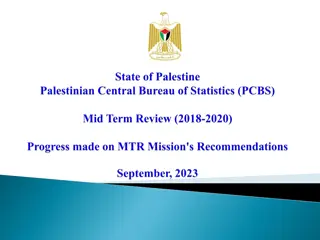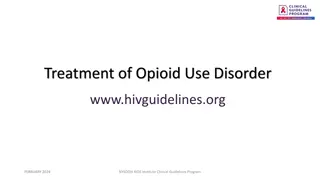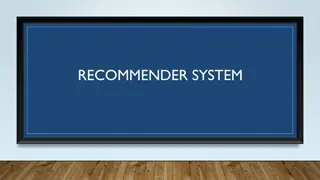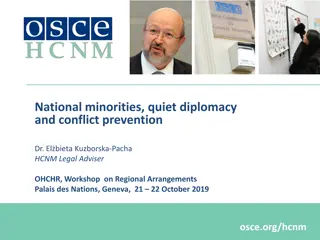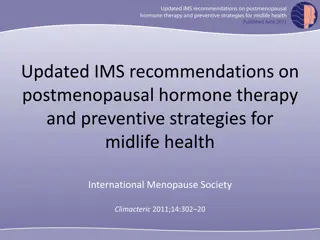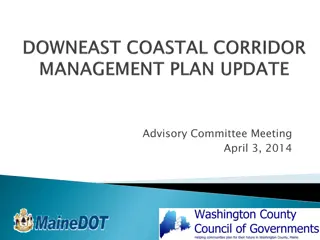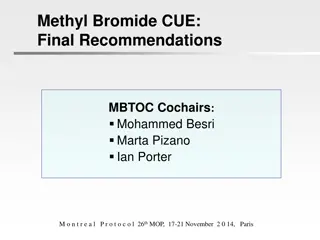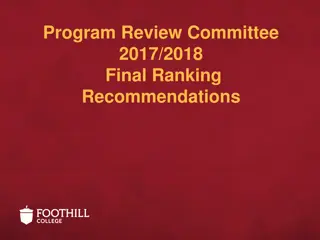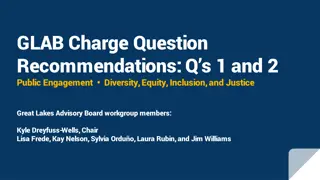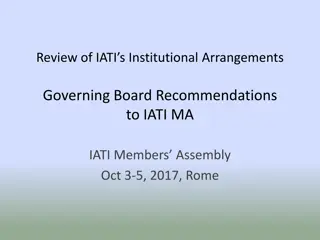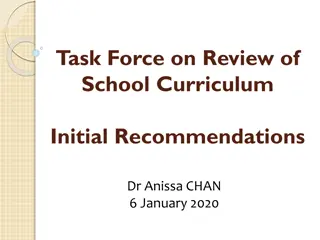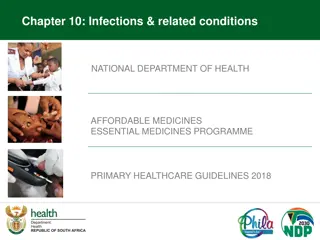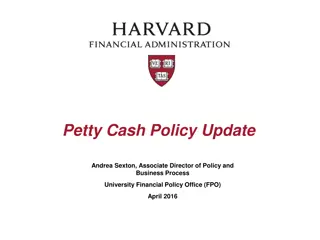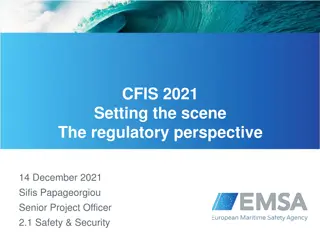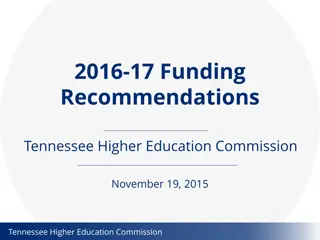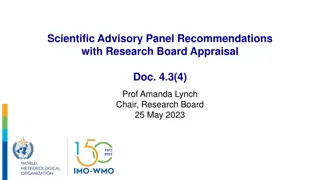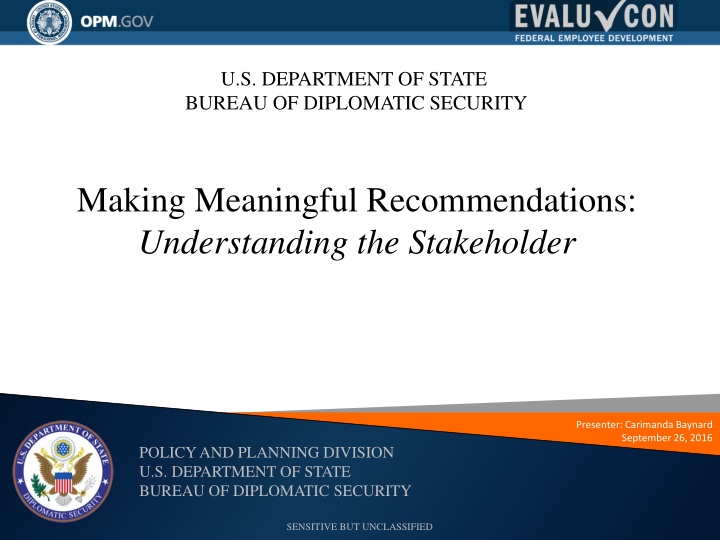
Diplomatic Security Evaluation Program Stakeholders
Explore how the U.S. Department of State Bureau of Diplomatic Security evaluates its programs, focusing on understanding stakeholders' perspectives and improving strategic communication efforts. Learn about the mission, evaluation approach, and the importance of stakeholder engagement in enhancing national security efforts.
Download Presentation

Please find below an Image/Link to download the presentation.
The content on the website is provided AS IS for your information and personal use only. It may not be sold, licensed, or shared on other websites without obtaining consent from the author. If you encounter any issues during the download, it is possible that the publisher has removed the file from their server.
You are allowed to download the files provided on this website for personal or commercial use, subject to the condition that they are used lawfully. All files are the property of their respective owners.
The content on the website is provided AS IS for your information and personal use only. It may not be sold, licensed, or shared on other websites without obtaining consent from the author.
E N D
Presentation Transcript
U.S. DEPARTMENT OF STATE BUREAU OF DIPLOMATIC SECURITY Making Meaningful Recommendations: Understanding the Stakeholder Presenter: Carimanda Baynard September 26, 2016 POLICY AND PLANNING DIVISION U.S. DEPARTMENT OF STATE BUREAU OF DIPLOMATIC SECURITY SENSITIVE BUT UNCLASSIFIED
Agenda Speaker Introduction Diplomatic Security Evaluation Program Understanding the Stakeholder Internal Evaluations Brand Recognition Meaningful Evaluation Recommendations Video & Discussion Questions POLICY AND PLANNING DIVISION U.S. DEPARTMENT OF STATE BUREAU OF DIPLOMATIC SECURITY 2 SENSITIVE BUT UNCLASSIFIED
Speaker Introduction Ms. Carimanda Baynard provides evaluation and strategic communications expertise to the Bureau of Diplomatic Security within the United States Department of State. She has the responsibility for monitoring and implementing program evaluations and ensuring strategic communication efforts align with the Bureau s mission. A graduate of the National Intelligence University, she obtained her Masters of Science degree in Strategic Intelligence, a Masters of Arts in Public Sociology from American University, and a Bachelor of Arts in Sociology from Washington College. She has a passion for crisis communications, strategic planning, and organizational evaluations designed to support national security efforts. POLICY AND PLANNING DIVISION U.S. DEPARTMENT OF STATE BUREAU OF DIPLOMATIC SECURITY 3 SENSITIVE BUT UNCLASSIFIED
Bureau of Diplomatic Security Mission: The mission of the Bureau of Diplomatic Security is to provide safe and secure platform for the conduct of U.S. foreign policy through the protection of life, property, and information. DS Evaluation Program: The DS evaluations program primarily uses a mixed methods approach to ensure that findings and recommendations address the objectives of the evaluation, enhance customer service, and support the objectives of improved efficiencies and overall program management in support of national security efforts. Through program and process evaluations, DS strives to use evaluation results to improve strategic planning, performance management and reporting, examine and rectify duplication of efforts, and ultimately achieve greater accountability. POLICY AND PLANNING DIVISION U.S. DEPARTMENT OF STATE BUREAU OF DIPLOMATIC SECURITY 4 SENSITIVE BUT UNCLASSIFIED
Understanding the Stakeholder While evaluation staff are interested in long term programmatic impacts, program staff are more interested in shorter-term projects. Evaluations can be a burden for program offices, given their workload. GAO: Strategies to Facilitate Agencies Use of Evaluation in Program and Policy Making Programmatic priorities Concerns and projected timeline Evaluation areas of focus Benefits of an evaluation Necessity of an evaluation POLICY AND PLANNING DIVISION U.S. DEPARTMENT OF STATE BUREAU OF DIPLOMATIC SECURITY 5 SENSITIVE BUT UNCLASSIFIED
Brand Recognition To assess operational proficiency and readiness Workforce planning Strength Weakness Opportunities and Threats (SWOT) analysis 30 Day Evaluation Short and long term strategic planning Mid and end of year performance planning Organizational effectiveness and process mapping (w/gap analysis) 60 Day Evaluation Combining services offered in both the 30 and 60 day options Depending on the necessity of programmatic concerns, the 90 day option can start the planning process for another assessment conducted by external evaluators 90 Day Evaluation POLICY AND PLANNING DIVISION U.S. DEPARTMENT OF STATE BUREAU OF DIPLOMATIC SECURITY 6 SENSITIVE BUT UNCLASSIFIED
Internal Evaluations Internal Policy and Planning Division Evaluation Evaluation Questions Mixed Methods Approach Recommendations and Next Steps POLICY AND PLANNING DIVISION U.S. DEPARTMENT OF STATE BUREAU OF DIPLOMATIC SECURITY 7 SENSITIVE BUT UNCLASSIFIED
Making Meaningful Recommendations Demonstrate leadership support of evaluations for accountability and process improvement. Build strong supporting evidence through methodology to support policy decisions. Engage stakeholders throughout the evaluation process to gain their input and insight. GAO: Strategies to Facilitate Agencies Use of Evaluation in Program and Policy Making POLICY AND PLANNING DIVISION U.S. DEPARTMENT OF STATE BUREAU OF DIPLOMATIC SECURITY 8 SENSITIVE BUT UNCLASSIFIED
Discussion Questions Is your agency a learning organization? How do you build a learning organization? Are there successes and/or challenges to building a learning organization? How can evaluations impact and shape organizational structure to promote process improvement, productivity, and operational proficiency? Video: https://www.youtube.com/watch?v=j1xE3x9_AP0 POLICY AND PLANNING DIVISION U.S. DEPARTMENT OF STATE BUREAU OF DIPLOMATIC SECURITY 9 SENSITIVE BUT UNCLASSIFIED
The process by which evaluation influences change is messy and complex. Policy changes do not occur as a direct result of an evaluation question; rather a body of evaluation results, research, and other evidence influences policy and practice over time. GAO: Strategies to Facilitate Agencies Use of Evaluation in Program and Policy Making POLICY AND PLANNING DIVISION U.S. DEPARTMENT OF STATE BUREAU OF DIPLOMATIC SECURITY 10 SENSITIVE BUT UNCLASSIFIED
POLICY AND PLANNING DIVISION U.S. DEPARTMENT OF STATE BUREAU OF DIPLOMATIC SECURITY 11 SENSITIVE BUT UNCLASSIFIED

